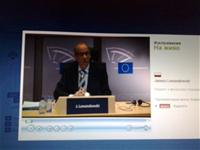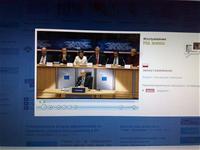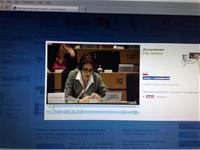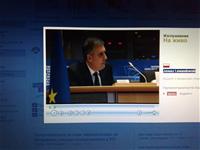Reform of the budgetary procedures
euinside, January 12, 2010
 The first hearings in the European Parliament of the Commissioners-designate in the second Barroso Commission, started today with the examination of the Polish nominee for Commissioner on budget policy Janusz Lewandowski. He has a lot of European and Polish experience in the field he is nominated for. In the previous parliament he chaired the Budget Committee. He also had an active role in Poland's accession process as well as in the transposition of the acquis communautaire (the European legislation) in the Polish legislation.
The first hearings in the European Parliament of the Commissioners-designate in the second Barroso Commission, started today with the examination of the Polish nominee for Commissioner on budget policy Janusz Lewandowski. He has a lot of European and Polish experience in the field he is nominated for. In the previous parliament he chaired the Budget Committee. He also had an active role in Poland's accession process as well as in the transposition of the acquis communautaire (the European legislation) in the Polish legislation.
His first priority would be the smooth adoption of the 2011 budget and beyond in accordance with the rules set out by the new institutional framework deriving from the Lisbon Treaty (from 1st of December 2009). He also plans the set up of a new Conciliation Committee with which the 2 arms of the budget authority will be fully established. The main function of the Conciliation Committee would be to solve disputes between the European institutions - the Commission, the Council or the Parliament. The Polish candidate also plans a reform of the Multiannual Financial Framework, also known as EU's financial perspectives which are prepared for a 7-year period. The current one expires in 2013.
Here you can read an euinside interview with Mr. Janusz Lewandowski, taken during the negotiations on the financial perspectives of the Union for the current period 2007-2013. A little later you can expect results from the hearing of Mr. Lewandowski which started at 13H CET and is expected to last 3 hours.
![]() 17:30 The main questions the MEPs asked Janusz Lewandowski in the first hour of the hearing in the Budgetary Control Committee in the European Parliament were related to the increase of control over the spending of the EU funds. Bulgaria was explicitly mentioned in a question as the country with the largest share of mistakes in reporting the spending of EU money. According to the commissioner-designate 11% is not an admissible level of error. For Bulgaria the level of error is 13% and is the highest in the EU against 0.3% in Germany which has the lowest level. But the problem is that especially the Cohesion Policy is 80% enforced by member states.
17:30 The main questions the MEPs asked Janusz Lewandowski in the first hour of the hearing in the Budgetary Control Committee in the European Parliament were related to the increase of control over the spending of the EU funds. Bulgaria was explicitly mentioned in a question as the country with the largest share of mistakes in reporting the spending of EU money. According to the commissioner-designate 11% is not an admissible level of error. For Bulgaria the level of error is 13% and is the highest in the EU against 0.3% in Germany which has the lowest level. But the problem is that especially the Cohesion Policy is 80% enforced by member states.
"The problem is in the different standards in member states. The standards are also different in the judiciaries of member states. Last year 13 bn euro have been returned in the EU budget from fines. But, please, take into account that not everything that is an error means fraud. I really insist in front of the public opinion that an error and fraud are not one and the same thing. In some cases yes, but not in all cases", Janusz Lewandowski underlined.
A very serious test for the Polish candidate was the question whether he supported an overall  reform of the Common Agriculture policy (CAP). The question was tricky because Poland is one of the member states which receives the largest % of the budget of the CAP, which on its hand amounts at 44% of the overall budget of the Community. However Mr. Lewandowski managed to keep certain distance from his nationality - a requirement for the position of a commissioner. According to him, the CAP is changing even now. He warned though against nationalisation and renationalisation of the agriculture policy. A good solution, he said, would be to change to the principle of volunteering - member states to direct their efforts to agriculture voluntarily if they want to keep the country regions in Europe.
reform of the Common Agriculture policy (CAP). The question was tricky because Poland is one of the member states which receives the largest % of the budget of the CAP, which on its hand amounts at 44% of the overall budget of the Community. However Mr. Lewandowski managed to keep certain distance from his nationality - a requirement for the position of a commissioner. According to him, the CAP is changing even now. He warned though against nationalisation and renationalisation of the agriculture policy. A good solution, he said, would be to change to the principle of volunteering - member states to direct their efforts to agriculture voluntarily if they want to keep the country regions in Europe.
Lewandowski indirectly supported a continuation of the payment of agriculture subsidies for the Eastern European countries because they still have problems with the removal of technologies, used in the agriculture if the new member states since the times of socialists Council for Mutual Assistance.
![]() 10:05 During the second hour of the hearing of Janusz Lewandowski - candidate for a Commissioner on budget policy, went on in the parliamentary Budget Committee. Most of the questions to the Polish candidate were related to the budget and the changes in the financial regulation because of the establishment of the new European External Affairs Service. The problem is that the service is sui generis which means that it will be a relatively independent institution - it will have its own budget but it is still unclear how the budget will be formed. For the purpose, given the entering into force of the Lisbon Treaty, the financial legislation in this field needs to be changes.
10:05 During the second hour of the hearing of Janusz Lewandowski - candidate for a Commissioner on budget policy, went on in the parliamentary Budget Committee. Most of the questions to the Polish candidate were related to the budget and the changes in the financial regulation because of the establishment of the new European External Affairs Service. The problem is that the service is sui generis which means that it will be a relatively independent institution - it will have its own budget but it is still unclear how the budget will be formed. For the purpose, given the entering into force of the Lisbon Treaty, the financial legislation in this field needs to be changes.
 Asked by the Bulgarian MEP from the EPP group Ms. Nadezhda Mihaylova, Janusz Lewandowski said that the financial regulation should be reviewed through the fast procedure if the Service is to be ready by April. According to Mr. Lewandowski, the operational expenses of the new institution should be part of the budget of the European Commission.
Asked by the Bulgarian MEP from the EPP group Ms. Nadezhda Mihaylova, Janusz Lewandowski said that the financial regulation should be reviewed through the fast procedure if the Service is to be ready by April. According to Mr. Lewandowski, the operational expenses of the new institution should be part of the budget of the European Commission.
Two questions to the Polish candidate asked the former Bulgarian foreign minister and now deputy chairman of the Budget Committee Ivaylo Kalfin. His question was related to the participation of the European Investment Bank in financing European projects. He also asked whether the president of the Commission Jose Manuel Barroso was not hoping too much on this bank. In response Janusz Lewandowski assured that because of the purposeful increase of the capital of EIB, there was no danger for its capacity of financing. But he added that nevertheless, the possibilities for financing of European projects should be increased.
According to Ivaylo Kalfin though, there was a real danger of creation of parallel budgets and of  duplication of financing. The candidate for a Commissioner on budget policy said that so as the EIB to be able to work effectively it needs to have the possibility to use freely money from the European budget. "We are well aware that we are talking about public finances. In many countries, including mine, we have problems with such money - their investment in public-private partnerships (PPP) because of prejudices to this form of financing, including because of fears of fraud. For the new member-states it is very complex to assume such an approach. However, if we want to enlarge our opportunities, we have to think about new financial instruments and the EIB is a very important source of financing", was the reply of Janusz Lewandowski.
duplication of financing. The candidate for a Commissioner on budget policy said that so as the EIB to be able to work effectively it needs to have the possibility to use freely money from the European budget. "We are well aware that we are talking about public finances. In many countries, including mine, we have problems with such money - their investment in public-private partnerships (PPP) because of prejudices to this form of financing, including because of fears of fraud. For the new member-states it is very complex to assume such an approach. However, if we want to enlarge our opportunities, we have to think about new financial instruments and the EIB is a very important source of financing", was the reply of Janusz Lewandowski.
![]() 14:11 The hearing of the Commissioner-designate for budget policy Janusz Lewandowski ended in both parliamentary committees - on budget and budget control. Many of the questions were related to the future of the Common Agriculture Policy, the budget of the Community after 2013 when the 7-year financial perspectives will end in the context of the entering into force of the Lisbon Treaty. In his conclusive remarks the chairman of the Budget Committee Alain Lamassoure explained that Mr. Lewandowski was accepted within the Committee with mixed feelings because some envied him because they wanted to be in his place and the younger MEPs wanted to follow his example.
14:11 The hearing of the Commissioner-designate for budget policy Janusz Lewandowski ended in both parliamentary committees - on budget and budget control. Many of the questions were related to the future of the Common Agriculture Policy, the budget of the Community after 2013 when the 7-year financial perspectives will end in the context of the entering into force of the Lisbon Treaty. In his conclusive remarks the chairman of the Budget Committee Alain Lamassoure explained that Mr. Lewandowski was accepted within the Committee with mixed feelings because some envied him because they wanted to be in his place and the younger MEPs wanted to follow his example.
The general impression was that the candidate was suitable for several jobs - as commissioner for agriculture, scientific research and even transport because he appeared to be very well prepared on many issues related to these jobs. The position he is designated for though is different after the entering into force of the Lisbon Treaty because now the Commissioner on Budget policy would very much resemble the position of a national finance minister than before. "Of course, you should be a great realist. But in the EU if you're only a realist, nothing can be achieved. Jean Monet had a very good formula - we should take into account the facts but not fatality - in Europe there are no fatalities", Lamassoure underlined.
He added that a lot of the participants in the hearing were aware that a new system within the new institutional context needs to be established. A little later, the Budgets Committee and the Budget Control Committee will present their positions regarding the candidacy of Mr. Lewandowski to the president of the European Parliament. If there are no obstacles, he will be approved together with the other 25 colleagues of his on the 26th of January at e plenary session.
Many of the MEPs, members of both Committees came for the hearing with an hour or even two later because of the hard winter conditions in Belgium and the Northern part of Europe.